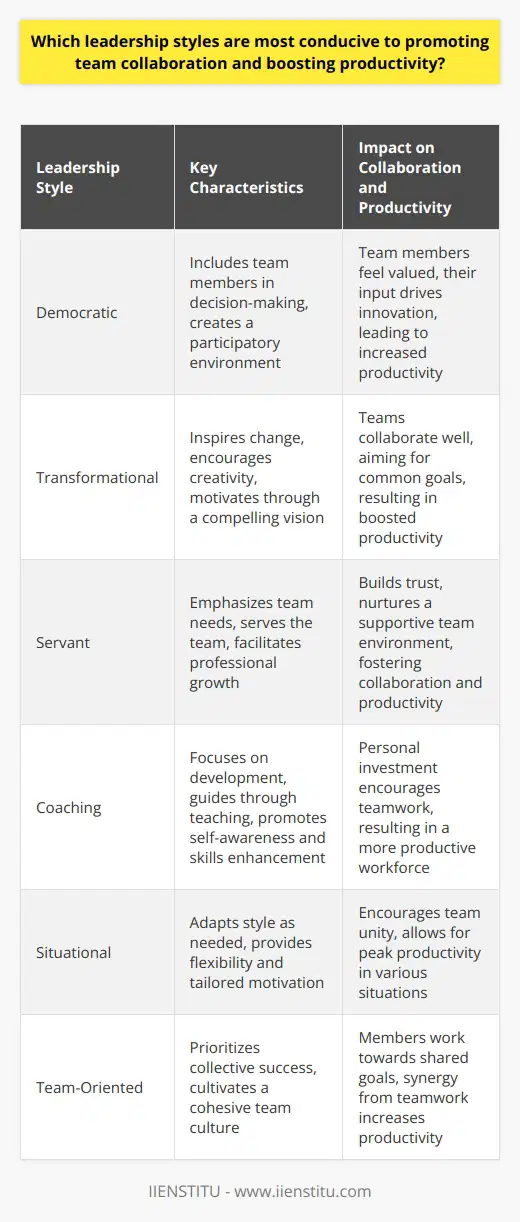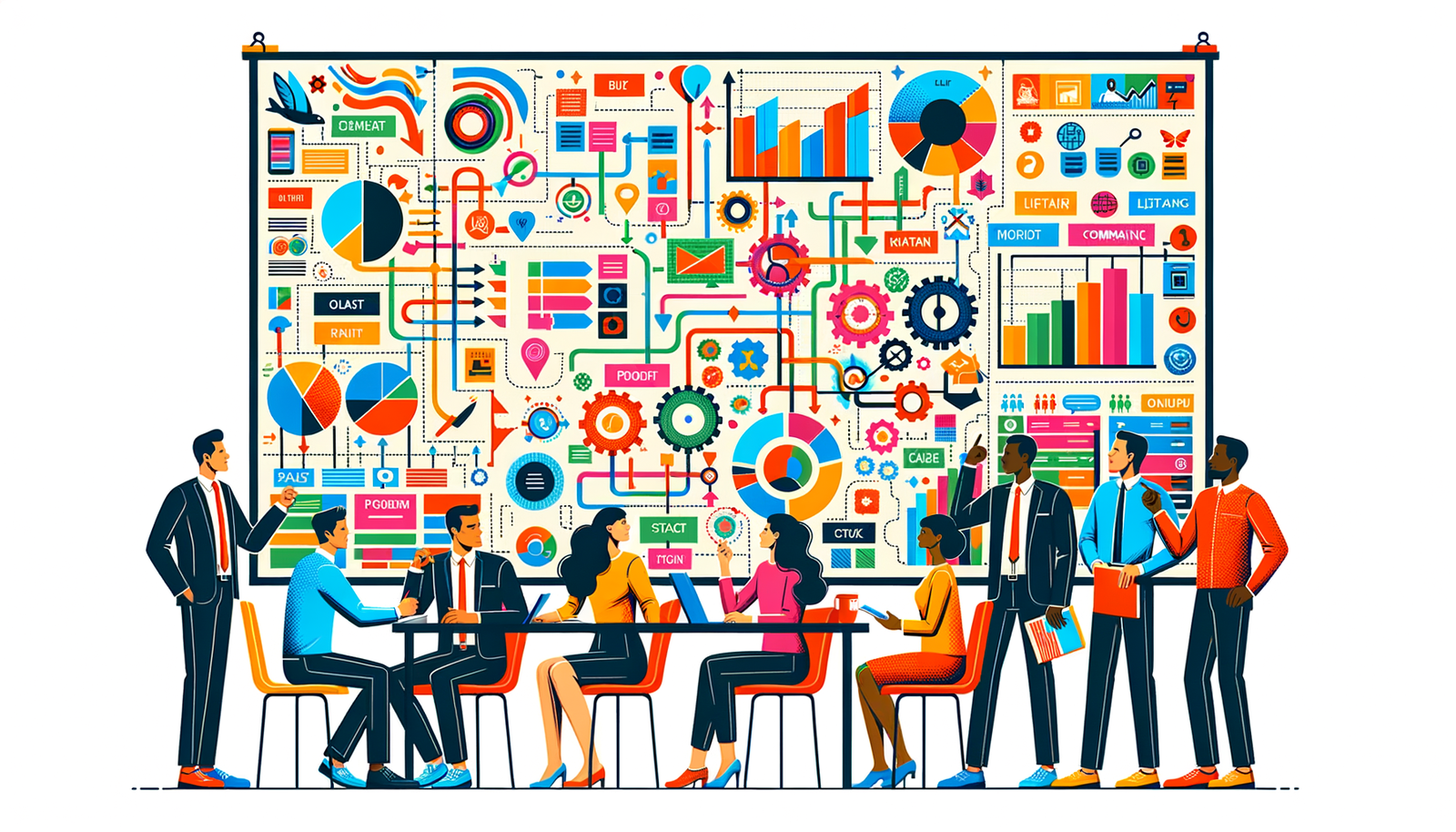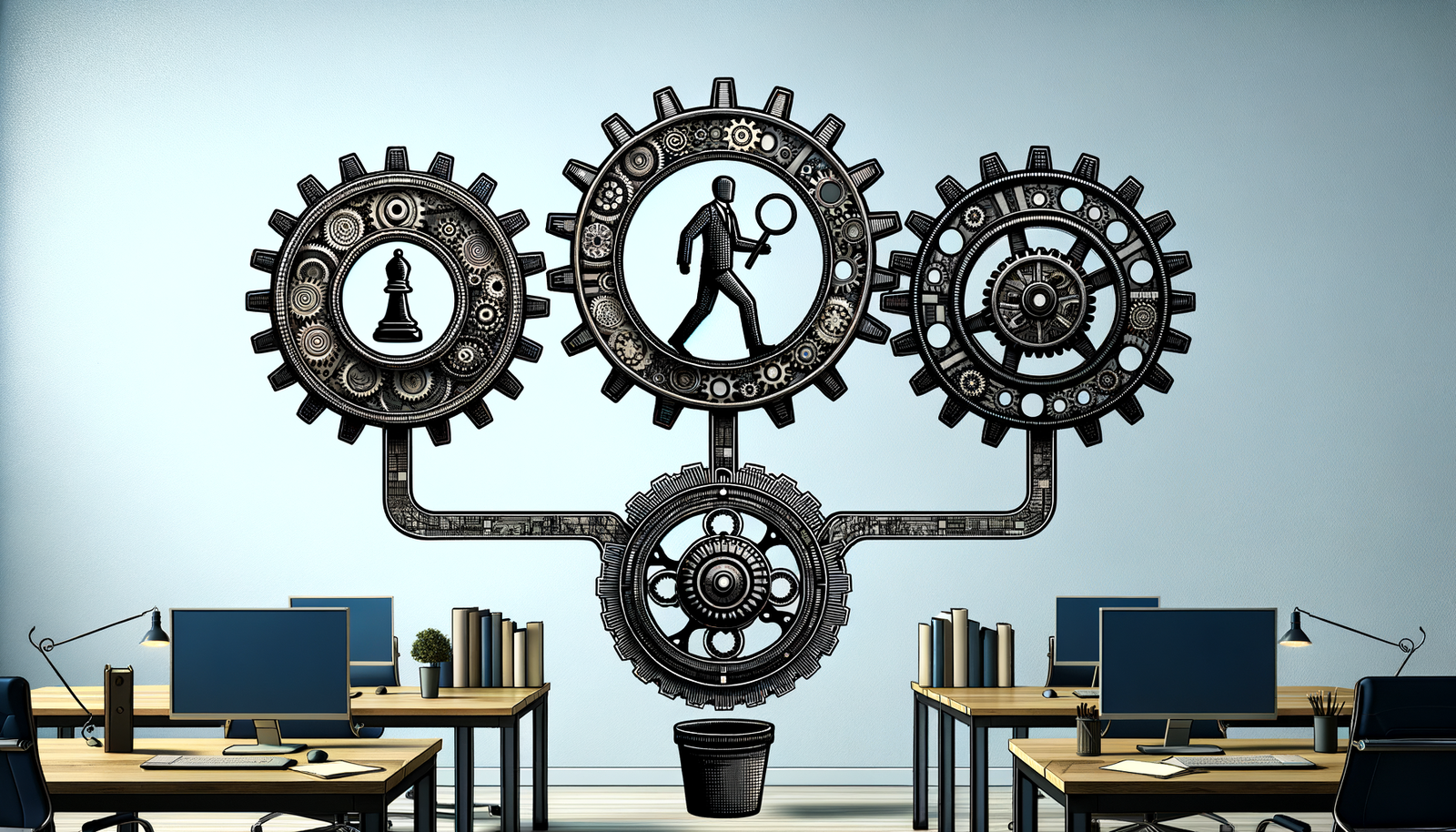
In today's fast-paced and highly competitive business environment, the importance of effective team collaboration and productivity cannot be overstated. Teams that are able to communicate clearly, leverage each other's strengths, and work together seamlessly are more likely to be innovative, responsive, and successful in the long run. The overall efficiency and success of an organization often reflect the quality of teamwork and collaboration among its employees.
As someone who has worked in various team settings throughout my career, I have witnessed firsthand the transformative power of strong collaboration. In one of my previous roles, I was part of a cross-functional team tasked with launching a new product line within a tight deadline. Initially, we struggled to align our goals and communicate effectively, leading to missed milestones and growing frustrations. However, our team leader recognized the need for intervention and implemented several strategies to enhance our collaboration and productivity.
First, we established clear roles and responsibilities for each team member, ensuring that everyone understood their specific contributions to the project. We also set up regular check-in meetings to discuss progress, share updates, and address any challenges or roadblocks. These meetings became a crucial platform for open communication, allowing us to voice concerns, offer suggestions, and brainstorm solutions together.
To further strengthen our collaboration, we participated in team-building activities and social events outside of work. These informal gatherings helped us build trust, rapport, and a sense of camaraderie, which translated into better teamwork in the office. We also embraced technology tools like project management software and instant messaging platforms to streamline our workflows and keep everyone on the same page.
As we continued to refine our collaboration strategies, our team's performance began to soar. We met our deadlines, delivered a high-quality product, and received recognition from upper management for our exceptional teamwork. This experience taught me that investing in team collaboration is not just a nice-to-have, but a critical factor in driving productivity and success.
But what does it take to build and maintain a highly collaborative and productive team? Based on my experiences and research, I believe there are several key strategies and best practices that organizations can implement to enhance workplace collaboration and boost team performance.
Establishing Clear Goals and Roles
One of the most important foundations of effective team collaboration is having a shared understanding of goals and individual responsibilities. When team members are unclear about what they are working towards or what is expected of them, it can lead to confusion, duplication of efforts, and decreased productivity.
To avoid these pitfalls, leaders should work with their teams to develop clear, specific, and measurable goals that align with the organization's overall mission and objectives. These goals should be communicated regularly and revisited as needed to ensure everyone stays on track. Additionally, each team member should have a well-defined role that outlines their specific tasks, deliverables, and areas of expertise. This clarity helps individuals take ownership of their work and understand how their contributions fit into the bigger picture.
In his book "The Advantage," Patrick Lencioni emphasizes the importance of creating a "thematic goal" for teams, which is a single, qualitative focus that serves as the rallying cry for the team over a specific period of time (Lencioni, 2012). By having a unifying goal that everyone can get behind, teams are more likely to stay motivated, aligned, and focused on what matters most.
Fostering Open Communication and Trust
Another critical component of successful team collaboration is open communication and trust. When team members feel comfortable sharing ideas, asking questions, and providing feedback, it creates an environment where creativity and innovation can thrive. Conversely, when communication is stifled or trust is lacking, it can lead to silos, misunderstandings, and a lack of psychological safety.
To foster open communication, leaders should encourage regular dialogue and create multiple channels for team members to share information and perspectives. This can include daily stand-up meetings, weekly team huddles, and ongoing digital conversations through email, chat, or project management tools. The key is to ensure that everyone has a voice and feels heard.
Building trust within a team takes time and effort, but it is essential for effective collaboration. Leaders can cultivate trust by modeling vulnerability, keeping their word, and showing genuine care and concern for team members' well-being. They can also create opportunities for team members to bond and build relationships outside of work, such as through social events, volunteer projects, or learning opportunities.
According to research by Google's Project Aristotle, psychological safety is the most important factor in determining team effectiveness (Duhigg, 2016). When team members feel safe to take risks, admit mistakes, and be themselves, they are more likely to collaborate openly and perform at their best.
Embracing Agile and Lean Methodologies
In recent years, many organizations have adopted Agile and Lean methodologies to improve team collaboration and productivity. These approaches emphasize flexibility, adaptability, and continuous improvement, allowing teams to respond quickly to changing priorities and deliver value more efficiently.
Agile methodologies, such as Scrum and Kanban, break down complex projects into smaller, manageable chunks and prioritize frequent communication and collaboration among team members. Teams work in short sprints, typically lasting two to four weeks, and hold daily stand-up meetings to share progress, identify obstacles, and make adjustments as needed. This iterative approach helps teams stay focused, aligned, and accountable to each other.
Lean principles, on the other hand, focus on eliminating waste and optimizing value streams to deliver maximum customer value with minimum resources. Teams that embrace Lean thinking constantly seek ways to streamline processes, reduce bottlenecks, and improve quality. They also rely heavily on data and metrics to track progress, identify areas for improvement, and make informed decisions.
When implemented effectively, Agile and Lean methodologies can have a significant impact on team collaboration and productivity. A study by the Project Management Institute found that Agile projects are 28% more successful than traditional projects, with higher levels of collaboration, transparency, and adaptability (PMI, 2017).
Leveraging Technology and Tools
In today's digital age, technology plays an increasingly important role in facilitating team collaboration and productivity. From project management software and virtual meeting platforms to instant messaging apps and file-sharing tools, there is no shortage of solutions available to help teams work together more efficiently.
One of the key benefits of collaboration technology is that it enables teams to communicate and collaborate seamlessly, regardless of location or time zone. This is particularly important for remote or distributed teams, who may not have the opportunity to meet face-to-face on a regular basis. By leveraging tools like video conferencing, screen sharing, and real-time document editing, remote teams can stay connected, aligned, and productive.
Another advantage of collaboration technology is that it provides a centralized platform for teams to manage projects, track progress, and share information. Project management tools like Asana, Trello, and Jira allow teams to create tasks, assign responsibilities, set deadlines, and visualize workflows in a transparent and organized way. This helps reduce duplication of efforts, improve accountability, and ensure everyone is working towards the same goals.
However, it's important to note that technology alone is not a silver bullet for team collaboration and productivity. Tools are only as effective as the people who use them, and they must be implemented in a way that supports the team's specific needs and goals. Leaders should work with their teams to select the right tools, provide appropriate training and support, and establish clear guidelines for how they will be used.
Measuring and Improving Team Collaboration
To continuously improve team collaboration and productivity, it's essential to measure progress and gather feedback regularly. This involves establishing clear metrics and key performance indicators (KPIs) that align with the team's goals and objectives, and tracking them over time to identify areas for improvement.
Some common metrics for measuring team collaboration and productivity include:
Project completion rate: The percentage of projects completed on time and within budget
Quality of work: The level of accuracy, thoroughness, and customer satisfaction associated with the team's output
Team satisfaction: The degree to which team members feel engaged, supported, and fulfilled in their work
Communication effectiveness: The frequency, clarity, and timeliness of communication among team members
Problem-solving efficiency: The speed and effectiveness with which the team identifies and resolves issues or challenges
By regularly tracking these metrics and soliciting feedback from team members, leaders can gain valuable insights into what's working well and what needs improvement. They can then use this information to make data-driven decisions, implement targeted interventions, and celebrate successes along the way.
Another powerful tool for improving team collaboration and productivity is the retrospective meeting. Popularized by Agile methodologies, retrospectives are regular meetings where the team reflects on their recent work, identifies strengths and weaknesses, and brainstorms ways to improve in the future. These meetings create a safe space for team members to share their perspectives, learn from each other, and take ownership of their collective success.
Conclusion
In conclusion, effective team collaboration and productivity are essential for organizations to thrive in today's fast-paced and ever-changing business landscape. By establishing clear goals and roles, fostering open communication and trust, embracing Agile and Lean methodologies, leveraging technology and tools, and continuously measuring and improving performance, teams can unlock their full potential and achieve extraordinary results.
As a leader, it's your responsibility to create an environment where collaboration and productivity can flourish. This requires a deep understanding of your team's unique needs, strengths, and challenges, as well as a willingness to experiment with new approaches and adapt to changing circumstances. It also requires a commitment to ongoing learning, growth, and development – both for yourself and your team members.
Ultimately, the key to success lies in recognizing that team collaboration and productivity are not one-time achievements, but ongoing processes that require constant nurturing and attention. By making collaboration a core value of your team and organization, and by consistently investing in the strategies and practices that support it, you can build a culture of high performance, innovation, and shared success.
References
Duhigg, C. (2016). What Google Learned From Its Quest to Build the Perfect Team. The New York Times Magazine. Retrieved from https://www.nytimes.com/2016/02/28/magazine/what-google-learned-from-its-quest-to-build-the-perfect-team.html
Lencioni, P. (2012). The Advantage: Why Organizational Health Trumps Everything Else in Business. Jossey-Bass.
Project Management Institute. (2017). Achieving Greater Agility: The Essential Influence of the C-Suite. Retrieved from https://www.pmi.org/learning/thought-leadership/pulse/achieving-greater-agility
Schmidt, E., & Rosenberg, J. (2014). How Google Works. Grand Central Publishing.
Sutherland, J. (2014). Scrum: The Art of Doing Twice the Work in Half the Time. Crown Business.
Frequently Asked Questions
What are the factors that can hinder team collaboration and productivity in a workplace?
Understanding Team Collaboration Challenges
Team collaboration forms the bedrock of productivity. Yet, obstacles often block its potential. Awareness of these can lead to more effective teams.
Communication Barriers
Effective communication is critical. Misunderstandings breed conflicts. Different communication styles can clash. Online-only interactions may lack non-verbal cues. Language differences further complicate matters. Without clear dialogue, collaboration falters.
Lack of Clear Goals
Goals guide teams. Ambiguity can derail projects. Team members need shared objectives. Each role requires clarity. With clear aims, direction is certain.
Inadequate Resources
Teams need tools. Insufficient resources limit potential. Outdated technology hampers efficiency. Supportive infrastructure fosters productivity. Budget constraints restrain team capability.
Leadership Deficits
Strong leadership unites teams. Poor leadership divides. Decisive leadership provides direction. Micromanagement stifles creativity. Leadership styles greatly influence outcomes.
Role Ambiguity
Clear roles are essential. Overlapping responsibilities cause confusion. Undefined roles lead to uncertainty. Accountability becomes difficult. Certainty in roles ensures smoother collaboration.
Differing Work Styles
Diversity brings strength. Yet, it also brings challenges. Individual work preferences vary. Harmonizing these preferences is key. A unified approach helps balance diversity.
Trust Issues
Trust is foundational. Distrust among members disrupts harmony. Trust builds productive environments. Suspicion breeds anxiety and conflict. A team must cultivate trust.
Resistance to Change
Change is constant. Adaptation is necessary. Yet, people often resist change. Stability is comforting. Embracing change accelerates growth. Resistance slows progress down.
Poor Conflict Management
Conflict is inevitable. Resolution is not. Poor conflict management damages morale. Efficient conflict resolution builds stronger teams. Strategies for management are critical.
Time Zone Differences
Global teams face this. Time zones complicate collaboration. Synchronizing schedules is demanding. Flexibility can bridge these gaps. Overlapping hours can ease interaction.
Teams face numerous hurdles. Knowing these is half the battle. Effective strategies can mitigate them. Thus, productivity and collaboration can flourish.
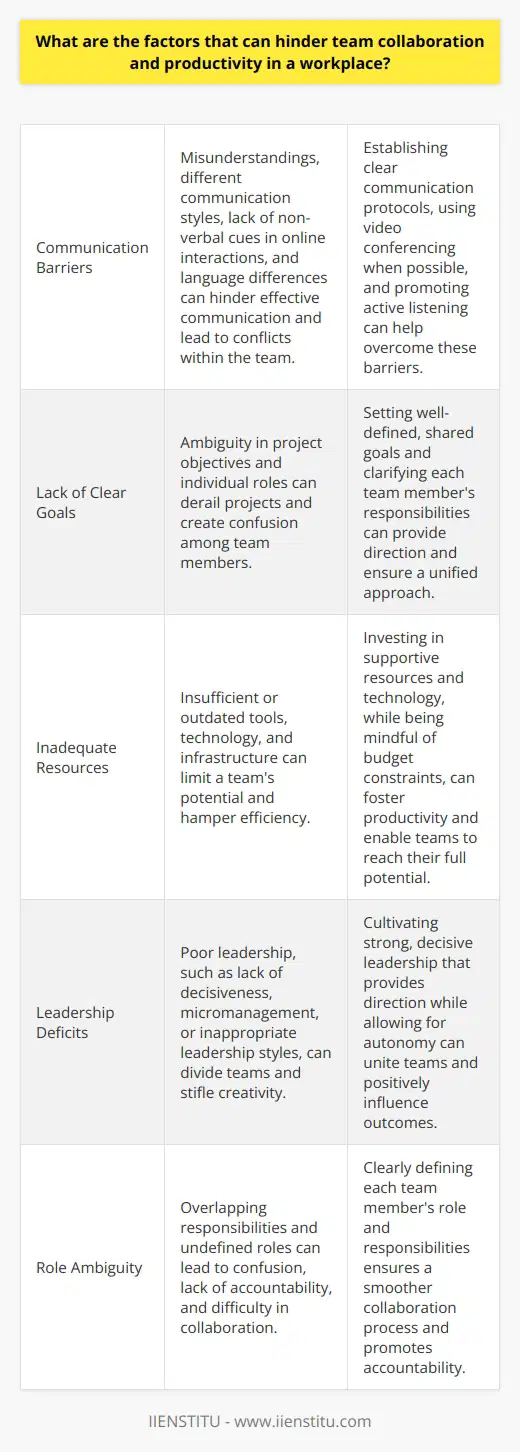
How does effective communication contribute to enhanced team collaboration and productivity?
Effective Communication: The Lifeblood of Teamwork
Understanding Communication Dynamics
Teams function on the exchange of ideas. Effective communication sets the stage for this exchange. It ensures members understand tasks and goals. It aligns individuals with a shared purpose. It fosters trust, leading to heightened morale and engagement.
Impact on Collaboration
Clarity cuts through confusion. It directs collaborative efforts consistently. Short, direct communication can prevent misunderstandings. When teams communicate well, they coordinate better. They solve problems faster. They share knowledge more efficiently.
Open dialogue encourages diverse perspectives. This breeds innovative solutions. Creative energy surges when members feel heard. It leads to robust brainstorming sessions and vigorous problem-solving debates.
Transparency builds trust. It forms a foundation for dependability. Trust ensures that team members feel secure enough to voice concerns. It strengthens the collaborative bond within the team.
Boosting Productivity
Communication streamlines processes. It defines roles and expectations precisely. Each member knows their responsibilities. They know who to ask for help. This clear division of labor avoids task duplication. It reduces time waste.
Feedback fuels continuous improvement. It guides performance. It corrects course. It promotes learning and skill enhancement. Effective feedback motivates teams to strive for excellence. This translates into improved outcomes and productivity.
Key Takeaways
Effective communication aligns teams.
Clarity and directness prevent misunderstandings.
Open dialogue unleashes creativity.
Transparency forges trust.
Streamlined processes lessen time waste.
Feedback guides and motivates improvement.
In sum, communication serves as the infrastructure supporting the edifice of teamwork. It is the lifeblood that allows the heart of collaboration to beat vigorously, driving the productivity of the team forward. Through effective communication, teams can minimize barriers, maximize efficiency, and achieve their collective goals with a higher sense of purpose and satisfaction.
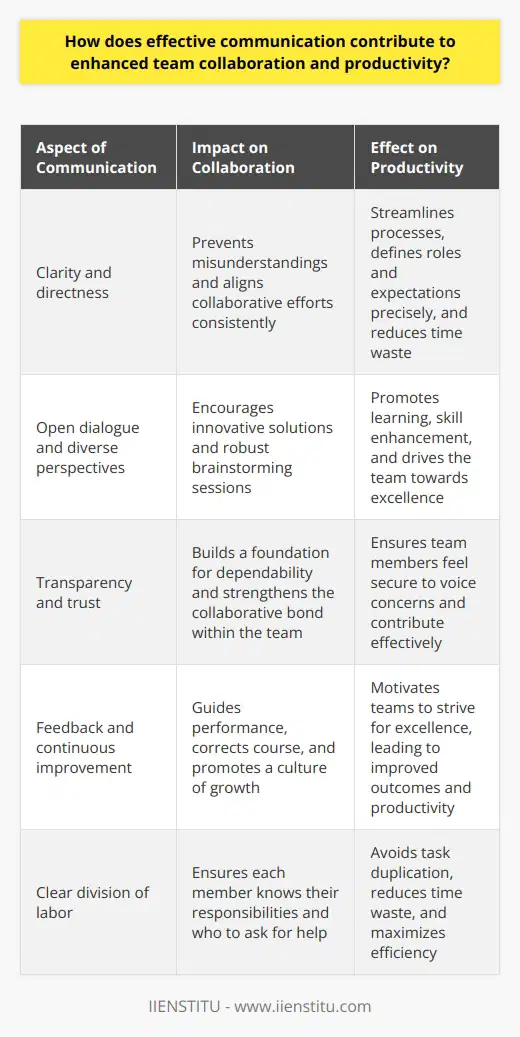
Which leadership styles are most conducive to promoting team collaboration and boosting productivity?
Understanding Leadership Styles
Leadership involves guiding teams. It affects team dynamics. Effective leaders know this. They adapt their styles accordingly.
The Democratic Leadership Style
The democratic style fosters collaboration. It includes team members in decision-making. This creates a participatory environment. Team members feel valued. Their input drives innovation. Consequently, productivity often rises.
Transformational Leadership Style
Transformational leaders inspire. They drive change. Such leaders encourage creativity. They motivate through a compelling vision. Teams under transformational leaders collaborate well. They aim for common goals. This boosts productivity.
Servant Leadership Style
Servant leadership emphasizes team needs. Leaders serve their teams. They facilitate professional growth. This builds trust. It nurtures a supportive team environment. Collaboration flourishes here. Productivity typically follows.
The Coaching Leadership Style
Coaching leaders focus on development. They guide teams through teaching. They promote self-awareness and skills enhancement. This personal investment encourages teamwork. It results in a more productive workforce.
Situational Leadership Style
Situational leaders adapt. They change style as needed. This flexibility can encourage team unity. It allows for tailored motivation. Peak productivity often occurs here.
The Team-Oriented Leadership Style
Team-oriented leaders prioritize collective success. They cultivate a cohesive team culture. Members work towards shared goals. Synergy from such teamwork can increase productivity.
Common Traits for Collaboration and Productivity
Certain traits span these styles. These promote collaboration and productivity.
Clear communication is essential. It ensures understanding.
Openness to feedback encourages improvement. It underscores respect.
Trust underpins effective teams. It builds a safe environment.
Supporting professional growth drives excellence. It leads to better output.
Empowerment spurs initiative-taking. It spaces for innovation.
Effective leaders blend these styles. They fit their unique team needs. The result often is a collaborative, productive team environment.
